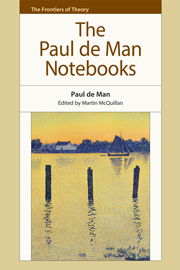Book contents
- Frontmatter
- Contents
- Series Editor's Preface
- Acknowledgements
- Dedication
- Introduction: ‘The Unimaginable Touch of Time’: The Public and Private in the Notebooks of Paul de Man
- PART I Texts
- PART II Translations
- PART III Teaching
- PART IV Research
- 27 The Unimaginable Touch of Time: Proposed Table of Contents
- 28 Modernism in Literature: Background and Essay Selection
- 29 Modernism in Literature: Revised Table of Contents
- 30 The Portable Rousseau: Table of Contents
- 31 The Portable Rousseau: Principle of Selection
- 32 Outline for a Monograph on Nietzsche
- 33 From Nietzsche to Rousseau
- 34 Allegories of Reading: Figural Language in Rousseau, Nietzsche, Rilke, and Proust
- 35 Aesthetics, Rhetoric, Ideology
- 36 11/3/82
- Appendix. The Notebooks of Paul de Man 1963–83
- Bibliography
- Index of Names
32 - Outline for a Monograph on Nietzsche
from PART IV - Research
Published online by Cambridge University Press: 05 December 2014
- Frontmatter
- Contents
- Series Editor's Preface
- Acknowledgements
- Dedication
- Introduction: ‘The Unimaginable Touch of Time’: The Public and Private in the Notebooks of Paul de Man
- PART I Texts
- PART II Translations
- PART III Teaching
- PART IV Research
- 27 The Unimaginable Touch of Time: Proposed Table of Contents
- 28 Modernism in Literature: Background and Essay Selection
- 29 Modernism in Literature: Revised Table of Contents
- 30 The Portable Rousseau: Table of Contents
- 31 The Portable Rousseau: Principle of Selection
- 32 Outline for a Monograph on Nietzsche
- 33 From Nietzsche to Rousseau
- 34 Allegories of Reading: Figural Language in Rousseau, Nietzsche, Rilke, and Proust
- 35 Aesthetics, Rhetoric, Ideology
- 36 11/3/82
- Appendix. The Notebooks of Paul de Man 1963–83
- Bibliography
- Index of Names
Summary
The juxtaposition of Rousseau and Nietzsche has not been studied, partly because Nietzsche has nothing good so say about Rousseau, partly because their main common interest has for a long time been neglected in works dealing with these two authors. Of late however the theory of language and of rhetoric that both develop in their early writings has received more and more attention (on Rousseau in the work of J. Derrida, R. Althusser, implicitly in Judith Shklar, etc.; on Nietzsche in recent books and articles by Ph. Lacoue Labarthe, Gilles Deleuze, B. Pautrat, etc.). The combined presence, in both authors, of an explicit theory of figural language together with concerns of an ethical and philosophical nature is particularly illuminating. In preparatory studies for this book I have begun to establish the systematic link between, on the one hand, the theoretical considerations on language in Rousseau's Second Discourseand in Nietzsche's early course on rhetoric, and, on the other hand, the historical, ethical and political themes that remain prevalent in their subsequent works (The Social Contract, Julie, Emile; The Geneology of Morals, Zarathustra, The Will to Power). Similar linkages between linguistic concerns and thematic assertions are found in various literary figures of the same period (Wordsworth, Mallarmé, Proust, Rilke, and others). The book tries to make a methodological contribution to the study of the relationship between the linguistic and the historical interpretation of nineteenth- and twentieth-century literature.
- Type
- Chapter
- Information
- The Paul de Man Notebooks , pp. 298 - 299Publisher: Edinburgh University PressPrint publication year: 2014



